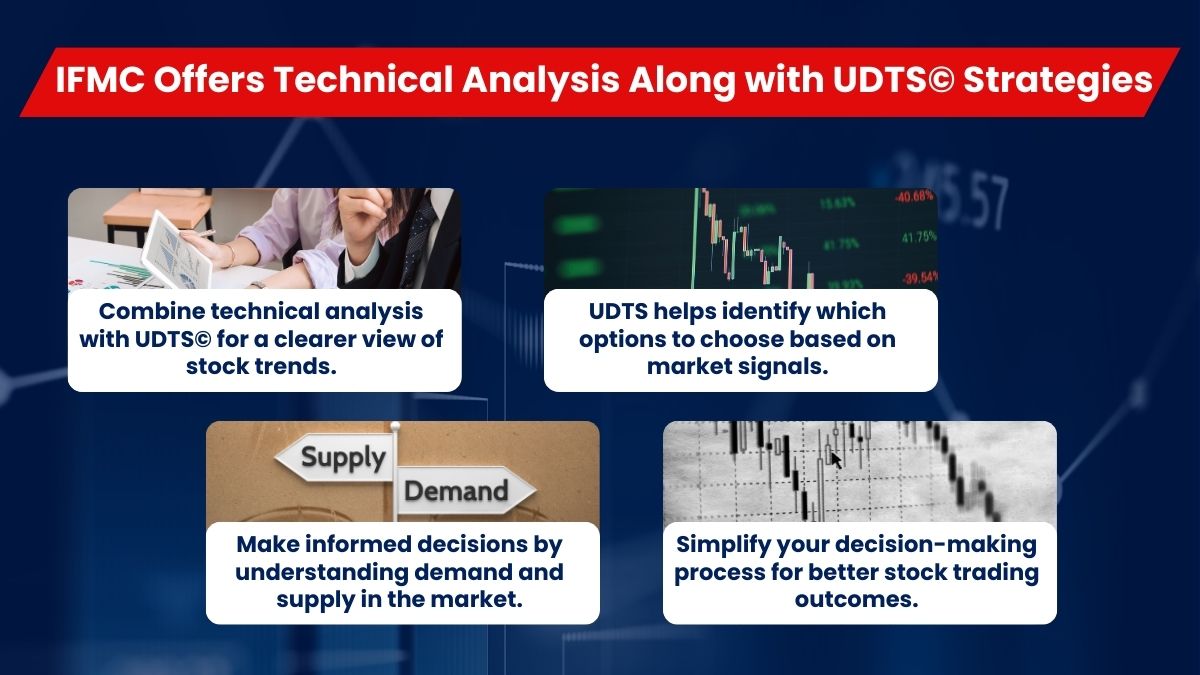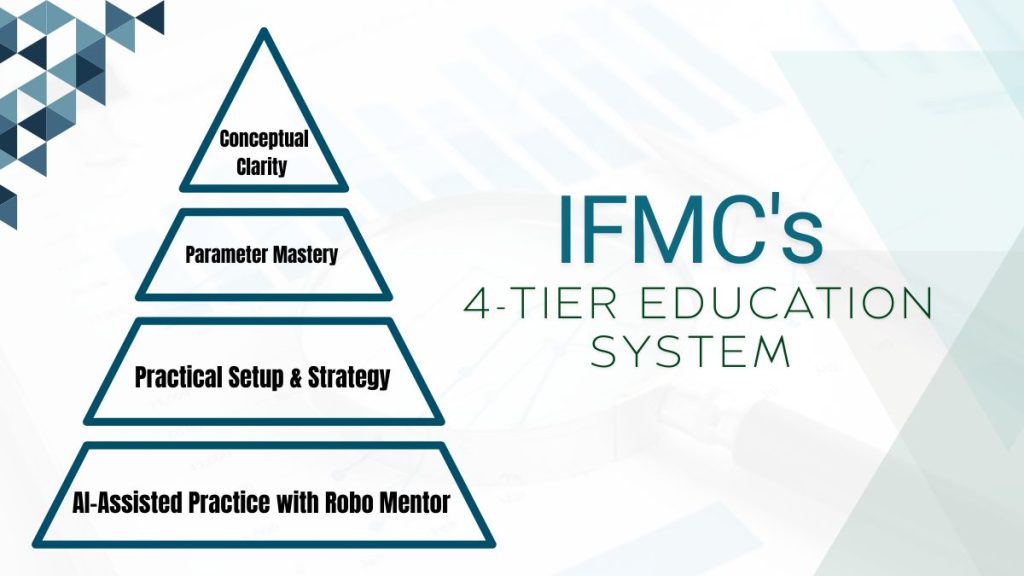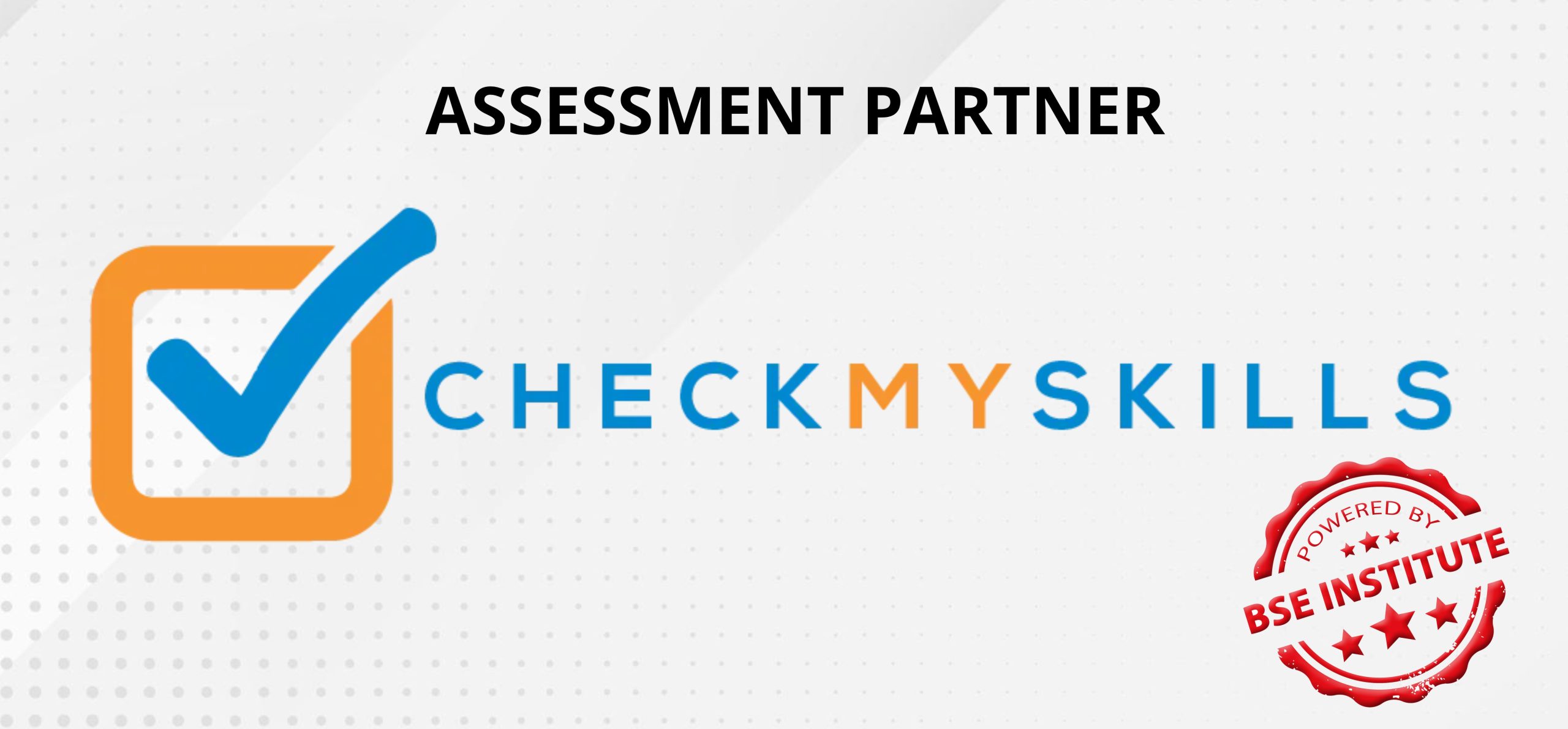Technical analysis forms the backbone of successful stock trading strategies. At IFMC Institute, we provide a cutting-edge NISM technical analysis course that aligns with NISM technical analysis certification requirements. Our program equips students with the skills to interpret market trends, make informed trading decisions, and excel in the dynamic world of stock markets.
The National Stock Exchange plays a crucial role in promoting financial literacy and facilitating certification programs through subsidiaries like NSE Academy.
Introduction to Technical Analysis
Technical analysis is a method of evaluating securities by analyzing statistical patterns and trends in their price and volume movements. Unlike fundamental analysis, which focuses on a company’s financial health and intrinsic value, technical analysis is rooted in the belief that historical price movements and trading volumes can predict future market behavior. This approach is invaluable for investors, traders, and portfolio managers who seek to identify market trends and make informed investment decisions. By understanding and applying technical analysis, market participants can gain insights into market psychology and enhance their trading strategies.
Why Choose IFMC for Technical Analysis Training?
IFMC brings you an NSE technical analysis course for students, brokers, and other financial professionals seeking to become a technical analyst and day traders. These types of courses will improve trading and portfolio management skills. Overall, it will help you to make better trading decisions. Technical Analysis Course offers intensive training on how securities, the price of equities, commodities, etc. The program covers basic and advanced concepts of technical analysis. It also focuses on the study of the past behavior patterns of the markets and how to exploit that information to make money while avoiding losses.

Students will learn unique strategies for entry and exit while boosting risk management skills. By the course is finished, students will be proficient in becoming short-term traders.
IFMC Institute stands out as India’s premier technical analysis course provider:
- Industry-recognized certification
- Expert instructors with real-world trading experience
- Comprehensive curriculum covering all aspects of technical analysis
- Flexible learning options: in-class, online, and live market sessions
- Hands-on practice with real-time market data
- Technical Analysis Exam NISM preparation and mock tests
Why Join Technical Analysis Course at IFMC?
- 15+ Years of stock market excellence
- NSE certified teachers
- Faculty with 30+ of experience
- Alumni base of 3,000
- Convenient stock market classes
- Practical stock trading examples
- Live trading sessions
- Placement assistance
Course Structure
Our technical analysis course is designed to take you from beginner to expert:
- Fundamentals of Technical Analysis
- Basic principles and concepts
- Comparison with fundamental analysis
- Understanding market psychology
- Chart Types and Patterns
- Candlestick charts
- Bar and line charts
- Identifying key patterns: head and shoulders, double tops/bottoms
- Technical Indicators
- Moving averages
- Relative Strength Index (RSI)
- MACD (Moving Average Convergence Divergence)
- Bollinger Bands
- Advanced Concepts
- Fibonacci retracements
- Elliott Wave Theory
- Volume analysis and its importance
- Risk Management and Trading Psychology
- Setting stop-losses and take-profit levels
- Managing emotions in trading
- Developing a disciplined trading approach
Check the complete NISM Technical Analysis Module
Understanding Market Trends and Patterns
Market trends and patterns are the cornerstone of technical analysis. A trend represents the general direction in which the market is moving, whether it be upward (uptrend), downward (downtrend), or sideways (sideways trend). Patterns, on the other hand, are specific formations that appear on charts, such as head and shoulders, double tops, and bottoms, which signal potential market reversals or continuations. Recognizing these trends and patterns is crucial for investors as it helps them identify potential opportunities and risks. Utilizing technical analysis tools like charts and indicators, investors can analyze these trends and patterns to make more informed decisions and optimize their trading strategies.
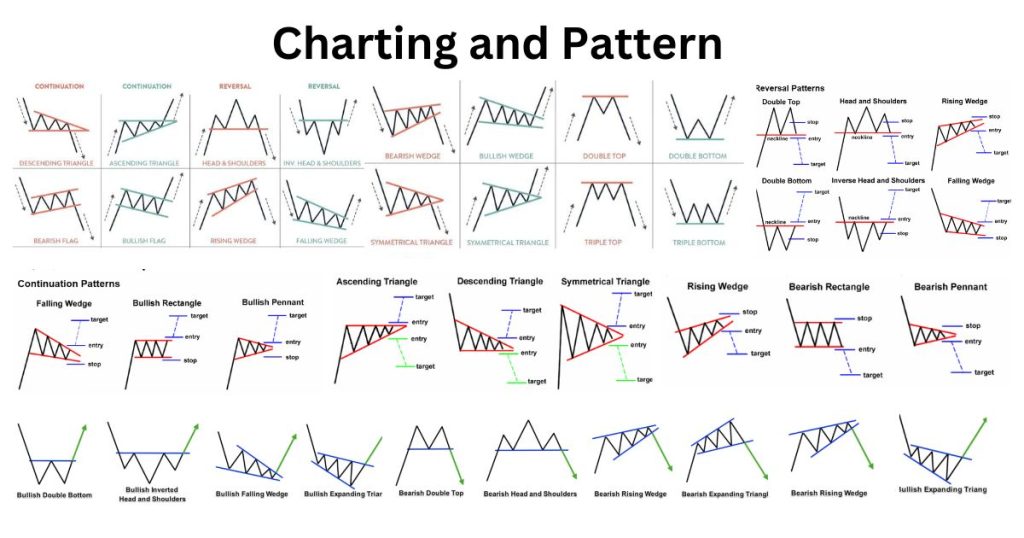
Technical Analysis Tools and Techniques
Technical analysis employs a variety of tools and techniques to decipher market trends and patterns. Charts, such as candlestick, bar, and line charts, visually represent price and volume data, making it easier to spot trends and patterns. Indicators, including moving averages, Relative Strength Index (RSI), and MACD (Moving Average Convergence Divergence), provide mathematical calculations that help identify market conditions and generate buy or sell signals. Additionally, concepts like Dow Theory offer a framework for understanding market trends, while open interest measures the number of outstanding contracts in a market, providing insights into market sentiment. These tools and techniques are essential for conducting thorough market analysis and making informed trading decisions.
Learning Methods
We offer multiple learning options to suit your schedule and preferences:
In-Class Technical Analysis Course NISM, NSE
- Face-to-face interaction with expert instructors
- Networking opportunities with fellow traders
- Intensive hands-on practice sessions
Online Technical Analysis Course
- Flexible, self-paced learning
- Access to recorded sessions for review
- Interactive Q&A forums
Live Market Technical Analysis
- Real-time market analysis and trading sessions
- Apply concepts to actual market conditions
- Expert guidance during crucial trading hours
Technical Analysis Mock Test
Technical Analysis module is an important Module for anyone who wishes to be a part of the stock market and one can predict the price moments in the market. The examination ensures that the person has minimum knowledge of this market. NCFM Technical Analysis Examination. The Technical Analysis Module is an Important Examination for those who wish to become Technical Analysts and acquire minimum knowledge to predict price movement knowledge of Technical one ensures to get a better understanding of profit targets and also makes you aware of the risks involved in the trade.
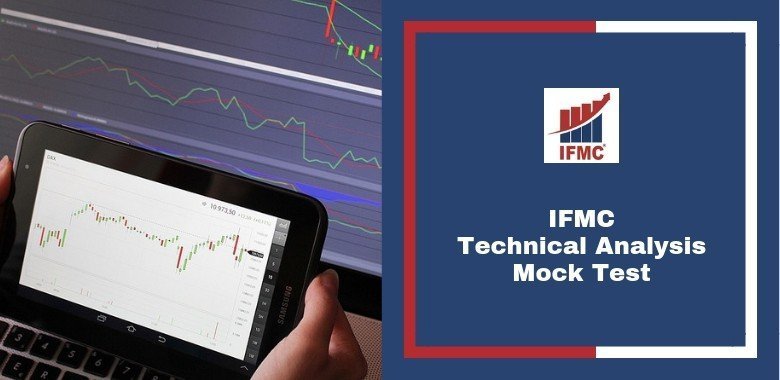
- NCFM Technical Analysis examination.
- This Mock Test has 208 questions in total.
- These practice papers give you a real-time feel.
- You get the correct answers and also the explanations.
- Actual examinations at NSE will have 60 questions.
- There will be a negative marking of 25% of marks.
- The passing score at NSE is 60%.
- The aim of the mock examination is to give candidates experience of the NCFM testing system.
- After taking these Mock Tests you will be confident and prepared enough to clear the exams.
Risk Management and Position Sizing
Effective risk management and position sizing are vital components of successful trading. Risk management involves identifying potential risks, such as market volatility and liquidity issues, and implementing strategies to mitigate them. Position sizing determines the appropriate amount to invest in a trade based on market conditions and individual risk tolerance. Technical analysis tools, such as stop-loss orders and position sizing models, help traders manage risk by setting predefined exit points and optimizing trade sizes. By employing these techniques, investors can minimize potential losses and maximize gains, ensuring a balanced and disciplined approach to trading.
Trading Strategies and Systems
Trading strategies and systems are structured approaches to implementing technical analysis in trading. A trading strategy outlines specific rules for making trading decisions, including entry and exit points, while a trading system uses these rules to generate buy and sell signals and manage risk. Technical analysis tools, such as charts and indicators, play a crucial role in developing and executing these strategies. By adhering to a well-defined trading strategy or system, investors can make more informed decisions, reduce emotional biases, and enhance their overall trading performance. This disciplined approach helps in achieving consistent results and optimizing returns in the financial markets.
NISM Certification Preparation
The National Institute of Securities Markets (NISM) Technical Analysis certification is a prestigious credential in the Indian financial sector. Our course is tailored to prepare you for the NISM certification exam:

- Comprehensive coverage of the NISM syllabus
- Regular mock tests to assess your progress
- Exam tips and strategies from certified experts
- Study materials aligned with the latest NISM guidelines
Eligibility To Join Technical Analysis
- Investors, traders, sub-brokers, entrepreneurs, and homemakers who want to grow their wealth
- Financial professionals and research analysts who want to upgrade their skills
- Employees working with banking and financial institutions
Career Opportunities After Certification
NISM certification in technical analysis opens doors to exciting career prospects:
- Professional trader
- A technical analyst for financial institutions
- Investment advisor
- Financial content creator
- Algorithmic trading developer
Many of our alumni have secured positions in top financial firms or launched successful independent trading careers.
Course Fees and Schedule
| Course Type | Duration | Fees (INR) |
|---|---|---|
| In-Class | 30 Hours | 16700 |
| Online | 6 Months | 4500 |
| Online Mock Test | 6 Months | 900 |
| Live Market | Along with Course | NA |
Conclusion
IFMC Institute’s technical analysis course offers a comprehensive path to mastering stock trading and achieving NISM certification. With our expert guidance, flexible learning options, and focus on practical skills, you’ll be well-equipped to navigate the complex world of financial markets.

Ready to transform your trading career? Enroll in our technical analysis course today!
FAQ
Is prior trading experience necessary for this course?
No, our course is designed for beginners and experienced traders alike.
How long does it take to complete the NISM certification after the course?
Most students complete the certification within 1-2 months after finishing our course.
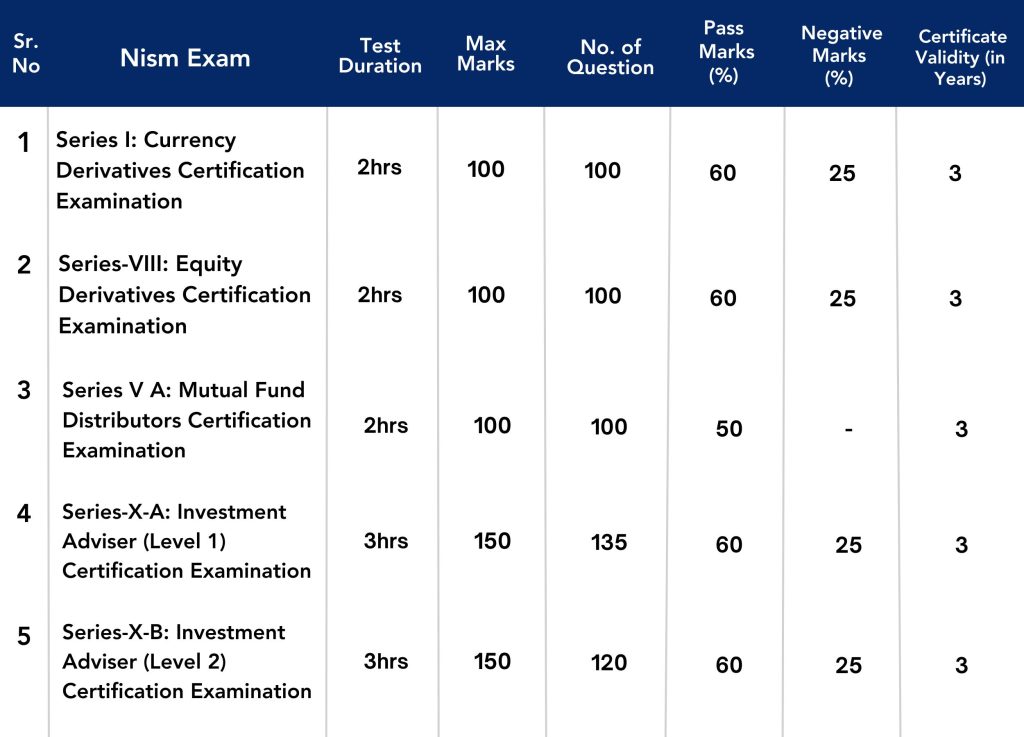
Does IFMC provide job placement assistance?
Yes, we offer career guidance and have tie-ups with leading financial institutions for placement opportunities.





